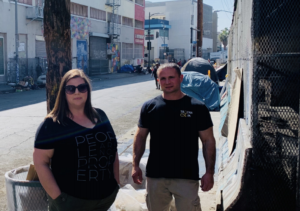
Brett Feldman (right) with wife Corinne Feldman, a Street Med physician’s assistant and Interim KSOM PA Program Director.
The group Harm Reduction International defines its core issue this way: “Harm reduction refers to policies, programs and practices that aim to minimize negative health, social and legal impacts associated with drug use, drug policies and drug laws.”
Since the problems of drug use and homelessness are intertwined, some activists trying to get more people off the streets have taken up the cause of harm reduction. Essentially, this means trying to repeal laws that criminalize drug use. Such laws tend to be popular with the public, but they demonize the very people they’re meant to help.
“Respondents who had negative views about these strategies also tended to have very negative views of opioid users,” according to the spring issue of Healing Hands, a publication produced by the Health Care for the Homeless Clinicians’ Network.
“Professionals working in the field of harm reduction strive to counter negative public perceptions with data that shows how harm reduction initiatives save lives, and advocate for policies that acknowledge the social implications and health impacts of criminalizing and punishing illicit drug misuse in communities.”
The Healing Hands issue is all about harm reduction, and the Keck School of Medicine of USC’s Street Medicine program is prominently featured. Street Med is part of a nationwide network of medical-outreach teams across the country who go into homeless communities to deliver what Director Brett Feldman calls “full-service primary care.” In Los Angeles, he and his team do everything from dispensing medication to drawing blood for labs, and they also try to get homeless people into housing and recovery programs. Street Med programs are seen as a key solution to the monumental effort to reduce rates of homelessness, as well as drug abuse.
Healing Hands describes the unique approach of street medicine programs everywhere:
Brett Feldman is the Director of Street Medicine and an Assistant Professor of Family Medicine at the Keck School of Medicine of the University of Southern California. He started the USC’s Street Medicine program that operates in Los Angeles, “but I don’t teach outside of the streets,” he explains: “We have students and fellows that come out with us, so I teach clinically on the streets using the streets as a classroom.”
Read the whole newsletter. It’s a great overview of the challenges ahead, as well as potential solutions.
— by Landon Hall